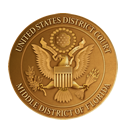- SCHEDULING. An attorney is expected to accommodate the schedules of opposing counsel. In doing so, the attorney should normally pre-arrange a deposition with opposing counsel before serving the notice. If this is not possible, counsel may unilaterally notice the deposition while at the same time indicating a willingness to be reasonable about any necessary rescheduling. Rule 30(a)(2)(A), Federal Rules of Civil Procedure, limits each side to no more than ten depositions unless otherwise ordered by the Court. Additionally, Local Rule 3.04 requires the party noticing the deposition to give a minimum of fourteen days' written notice to every other party and the deponent, absent agreement or an order based upon some exigent circumstance. And giving substantially more than fourteen days' notice is strongly encouraged. Rule 30(d)(1) limits a deposition to one day of seven hours unless otherwise authorized by the Court or stipulated by the parties. This is generally interpreted to mean seven hours of actual testimony, and does not include time spent for meals, rest, or refreshment.
- PERSONS WHO MAY ATTEND DEPOSITIONS. Each attorney may ordinarily be accompanied at the deposition by one representative of each client and, in technical depositions, one or more experts. Business necessity may require substitution for the representative of a party, but this privilege should not be abused. Attorneys may also be accompanied by records custodians, paralegals, secretaries, and the like, even though they may be called as technical witnesses on such questions as chain of custody, the foundation for the business record rule, or other technical matters. While more than one attorney for each party may attend, only one should question the witness or make objections, absent an agreement to the contrary. Those in attendance should conduct themselves in the manner expected during courtroom proceedings in the presence of a judge. Conduct during depositions should accord with Local Rules 5.03(c)(5), (8), and (9), and (d)(2), Middle District of Florida.
- PLACE WHERE DEPOSITION MAY BE TAKEN. A nonresident plaintiff may reasonably expect to be deposed at least once in this district during the discovery stages of the case and a non-resident defendant who intends to be present in person at trial may be deposed at least once in this district during discovery.
- DESIGNATIONS BY AN ORGANIZATION OF SOMEONE TO TESTIFY ON ITS BEHALF. In issuing or responding to a properly drawn notice of deposition pursuant to Rule 30(b)(6), Federal Rules of Civil Procedure, counsel should adhere to the following guidelines:
- Conference. Before or promptly after the notice or subpoena is served, the serving party and the organization must confer in good faith about the matters for examination.
- Requested Areas of Testimony. A notice or subpoena to an entity, association, or other organization should accurately and concisely identify the designated area(s) of requested testimony, giving due regard to the nature, business, size, and complexity of the entity being asked to testify.
- Designating the Best Person to Testify for the Organization. An entity, association, or other organization responding to a deposition notice or subpoena should make a diligent inquiry to determine the individual(s) best suited to testify.
- Reasonable Interpretation Is Required. Both in preparing and in responding to a notice or subpoena to an entity, association, or other organization, a party or witness is expected to interpret the designated area(s) of inquiry in reasonable manner consistent with the entity's business and operations.
- If in Doubt, Clarification Is Appropriate. A responding party or witness, who is unclear about the meaning and intent of any designated area of inquiry, should communicate in a timely manner with the requesting party to clarify the matter so that the deposition may proceed as scheduled. The requesting party is obligated to provide clarification sufficient to permit informed, practical, and efficient identification of the proper witness.
- Duty to Prepare Witness. Counsel for the entity should prepare the designated witness so that the witness can provide meaningful information about the designated area(s) of inquiry.
- Conference. Before or promptly after the notice or subpoena is served, the serving party and the organization must confer in good faith about the matters for examination.
- IF AN OFFICER LACKS KNOWLEDGE. Whenever an officer, director, or managing agent of an entity is served with a deposition notice or subpoena that contemplates testimony on a subject about which the witness lacks knowledge or information, that individual may submit to the noticing party, reasonably before the date noticed for the deposition, an affidavit or declaration under penalty of perjury so stating and identifying a person within the entity, if any, having knowledge of the subject matter. The noticing party should then proceed with the deposition of the officer, director, or managing agent initially noticed or subpoenaed only after careful consideration and for a specific reason, provided to the deponent in writing in advance of the deposition.
- CONSIDERATION FOR AN ORGANIZATION'S SENIOR MANAGEMENT. If information is sought from an organization, counsel ordinarily should not seek in the first instance to take the deposition of the organization's senior management if someone else in the organization can be expected to have more direct and firsthand knowledge or information. Depositions are not properly used as a mechanism to inconvenience or distract senior management who may not be immediately involved in the dispute.
